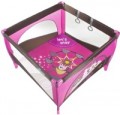— Fabric. Dense fabric protects the baby inside the playpen from accidental drafts; in addition, it is safe when falling — the kid will not hurt himself/herself by falling on a soft wall. On the other hand, the fabric is opaque, and you can see the kid only by looking into the playpen from above. This is not very convenient, because completely
fabric playpens are practically never found.
—
Mesh. These playpens feature walls crafted from a fine mesh. The transparency eliminates the need to peer from above, allowing easy observation of the baby. The softness of the mesh ensures safety if the baby happens to fall against the walls. However, it is essential to note that the mesh might be less effective in shielding against accidental drafts, requiring careful consideration when choosing the playpen's placement.
— Fabric/mesh. Such models combine two materials: the end walls are most often made of fabric, and the sidewalls can be either entirely mesh or fabric with windows made in them. In such a playpen, the kid is better protected from drafts than in a mesh; at the same time, the walls allow you to see the child without looking from above, and it's ok to fall on them.
—
Plastic. Walls made of coloured plastic. They can be both solid and in the form of slats; in the latter case, the child can use them as a support to get to his/her feet. Some mo
...dels combine both options. The disadvantage of plastic is hardness — falling on it is fraught with painful bruises, and therefore this material is used quite rarely, mainly in models with a plastic frame (refer to "Frame material").
— Wood. Wooden walls are usually made in the form of slats. On the other hand, they offer little protection against accidental drafts and a fall on such a wall can be quite painful. This variant is used in models with a wooden frame; for the characteristics of wood, see the corresponding subparagraph under "Frame material".
— Metal. Metal walls, like the wooden walls described above, are made in the form of slats and have all the characteristic features of such structures: the child is always visible, but is not protected from drafts. On the one hand, this material is much more durable than wood, but on the other hand, it is less pleasant to the touch: metal slats feel cold. In light of this, this option is not particularly widespread.
— PVC/fabric. A specific synthetic fabric type involves a polyester mesh with a PVC coating. This material is applied to foam frames in some dry pools for protective purposes (refer to "Purpose"). The PVC coating can be either one-sided (external) or two-sided, with no significant difference. Playpens with PVC fabric have a smooth and slippery surface, safeguarding children from abrasions during play. This robust, durable, waterproof material withstands sunlight well and is easily cleaned from most contaminants.
— Vinyl leather. Synthetic material, which belongs to high quality leather substitutes. However, vinyl leather is one of the varieties of PVC-fabric described above and does not differ from it in its main properties and features and is used in the same way - as a cover for foam frames in dry pools.
— Vinyl. A dense polymer film used exclusively in inflatable dry pools (refer to "Purpose"). The properties and advantages of this material are described under "PVC/fabric" above. In fact, the pure vinyl differs from the polymer-fabric surface only in the absence of a fabric base — it is simply not required in this case.
For dry pools in this case, it is usually specified the material of the shell, which covers the walls - this material is what the child comes into contact with (inside such a shell is a foam rubber frame, for more details see "Frame Material").
